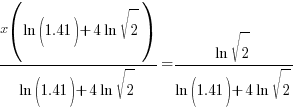Example:

Solution:
 |
|
| Since the bases cannot be easily written the same use the method of taking the log of both sides |   |
| Use the power rule for logarithms |   |
| Use the distributive law |   |
   |
|
| Factor the common x |   |
| Solve for x by dividing both sides by the factor in the parenthesis and simplify |    |
| The solution |   |
When you type this into a calculator be sure to use parenthesis around the numerator and around the denominator. Here is an example of how you might enter it.
(ln (sqrt{2}))/(ln(1.41)+4 ln(sqrt{2}))
Here is a youtube video with a similar example.